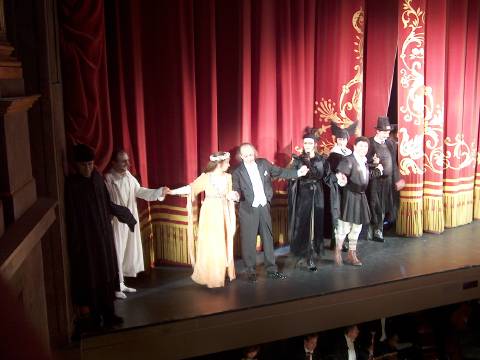|
<< -- 3 -- Tess Crebbin BATON MAGICIAN?

TC: What are you like to work with as a conductor? Are you very hard on your musicians? Judging by how good you make them sound, one can almost imagine you lock the doors and don't let them out until they have overcome even their last little limitation.
DS: Oh no, I wouldn't do anything like that. That kind of stuff just doesn't work in today's time and age. You need to be tough to achieve excellence, for sure, but you can also be nice and tough at the same time. I do not see any need for being ugly to your orchestra. I am certainly very meticulous in my approach to the score, and I make sure that every last little detail comes across as close to perfection as I possibly can, but I also try to be very encouraging. I believe in positive reinforcement, motivating people to give their best not because of fear but because they really want to, for the sake of making brilliant music.
TC: Talking of which, I see one big hindrance to excellence in German orchestras, which is the whole concept of what they call 'Beamtentum' here. They are civil servants and you can't fire them, is that correct?
DS: Yes, it sure is.
TC: So, once someone got hired and he is a civil servant, what is there to stop a musician in a German orchestra from playing half-heartedly? He could just turn up, play the notes on the paper, and not care much how it sounds. As conductor, you are not free to show him the door and he knows that. You can't even degrade him from 2nd to 3rd desk of the violins or whatever.
DS: That is true, but on the other hand, if someone were to take this approach, there is a lot of peer group pressure. The musicians as a whole are ambitious and they are in this for the love of music, not because they want a safe job they could not be fired from. I truly believe that they are here because they seek excellence and they strive for it. We have a very strong artistic review committee in the orchestra itself, made up of musicians. It is called 'Kuenstlerischer Beirat'. They meet every month and discuss whether there are people with problems. If there are, they will be told and made to feel very uncomfortable. But in my orchestra, I do not believe there is any player there right now who is not trying to give their very best.
TC: What is the main difference between conducting symphony and opera, and what does one have to look out for?
DS: Standing in the opera pit, you have a very confined space to deal with. Especially at our Munich house, this is very noticeable. The sound cannot travel as well and people here are not hearing the very best we can sound like.

Taking their bows, David Stahl at the Munich Gaertnerplatz Theatre with members of the ensemble, after a concert performance of Puccini's 'Il Trittico'. Photo © 2006 Philip Crebbin
|
TC: And, of course, you are stuck in the pit where nobody can see you.
DS: So what? I don't conduct for my ego. I conduct because I strive to make great music. This you can do anywhere, you don't need to be seen for it.
Continue >>
Copyright © 29 March 2006
Tess Crebbin, Germany

|

